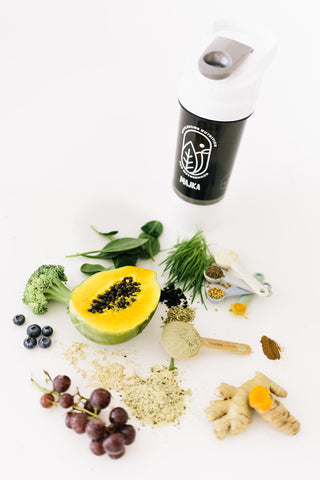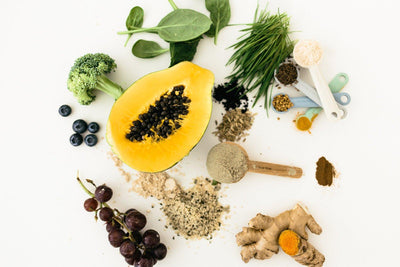To put it in extremely millennial terms, prenatal nutrition gets a lot of hype. Even if you’ve never been pregnant before, you’ve heard of, or at least seen, prenatal vitamins hanging out in the health aisle.
But when it comes to the prenatal vitamin's slightly less popular counterpart — the postnatal vitamin — not too many people talk about its importance for both mothers and their babies.
At Majka, we place a strong emphasis on the significance of postnatal nutrition, especially when you're breastfeeding. To say it bluntly, Motherhood isn’t for wimps. It is mentally, emotionally, and physically tolling and to make sure you’re equipped to handle everything this tiny little human (sometimes literally) throws at you, you need to be at your strongest health.
If you are on the hunt for a postnatal vitamin, here are a few central ingredients your postnatal supplement should include.
Vitamin D
There are movies, TV shows, books, and memes that joke about the life changes that occur right after the baby is born. While there are dreamy, quiet moments of you staring into your baby’s eyes and wondering how you’ve ever survived without this person in your life, there are also moments of complete and utter discord.
Because there is so much to adapt to, you probably aren’t thinking about going out in public just to soak up some vitamin D, and trust us, we get it.
Because both mothers and babies aren’t usually exposed to sunlight for a while post-birth, vitamin D levels are low. Breast milk is plentiful in natural vitamins and antibodies, but is on the lower end of vitamin D sufficiency.
To combat this, your postnatal vitamin should include proper amounts of vitamin D to satisfy both you and your baby’s necessities. Vitamin D supports healthy bone development and absorption of calcium (which we'll talk about later).
Folate
Folate is a nutrient found in broccoli, brussels sprouts, cabbage, kale, spinach, chickpeas, and kidney beans. It’s important during pregnancy, postpartum, and breastfeeding.
During pregnancy, it helps with the baby’s development. Postpartum intake is responsible for cell renewal, heart health, and red blood cells. While breastfeeding, folate helps the baby’s brain develop!
| Doctors recommend 600 micrograms per day during pregnancy, 400-800 during postpartum, and 500 while breastfeeding. |
Low folate levels can often be fixed with an increase in vegetables. However, supplementation is sometimes necessary.
An easy way to supplement is with folic acid. This is a synthetic form of folate that comes in capsule pills and is very easy to incorporate into your day. Just take them with the rest of your vitamins!
Because folic acid is synthetic, 30-40% of women do have trouble processing it. If that’s you, focus on getting enough natural folate by upping your vegetable intake.
You can also look for supplements or multivitamins that contain methylfolate, the active form of folate. This form should be easier for your body to absorb and use.
Note: Oral contraceptives and certain antibiotics can inhibit folate absorption.
Iron
The amount of blood loss while giving birth severely lowers your iron levels. While you may be reading this days or weeks after delivery, your body is still vulnerable and as such, is prone to lochia (bleeding following birth) or postpartum anemia. Because of this, iron is a critical component in your postnatal vitamin as it renews blood health in the mother.
As for your infant, the most recent research shows that iron levels are believed to be adequate enough to support your baby for the first 6 months of life. Breast milk, however, is low in iron and should be supported by the mother’s nutritional intake.
Choline
Choline is a form of vitamin B. During pregnancy, choline is most commonly known to help the development of the baby’s nervous system, protection against stress or metabolic disorders. In mothers, choline can help ease symptoms of decreased focus and memory, colloquially termed “pregnancy brain.”
While nursing, choline in breast milk is directly linked to the mother’s current levels of choline. This makes the importance of having choline as an ingredient in your postnatal vitamin essential. Choline in breast milk has been said to lead to increased IQ levels later in the child’s lifespan. If not in supplement form, choline can be found in egg yolks, broccoli, cauliflower, cruciferous veggies, brewer’s yeast, quinoa, and almonds.
Omega-3 Fatty Acids
The Centers for Disease Control and Prevention (CDC) conducted studies in the United States and found that 1 in 9 women experience postpartum depression symptoms. 121 million women experience postpartum depression globally.
There are multiple factors that contribute to postpartum depression and every woman’s body will react differently, but women with a deficiency in omega-3 may experience increased feelings of postnatal depression. This is why finding a postnatal vitamin containing omega-3 fatty acids, specifically DHA, as a prime ingredient is vital.
Not only will the omega-3 fatty acids fight against symptoms of postpartum depression in the mother, it also encourages healthy brain development in your newborn. Nutritional experts recommend a daily consumption of at least 200mg of fatty acids while breastfeeding and is often found in fish, especially salmon and sardines.
Calcium
When breastfeeding, women’s levels of calcium are depleted as it gets passed to your baby. In the initial stages of nursing, a mother loses 3–5% of her bone density, making calcium a critical ingredient in your postnatal vitamin.
Although bone loss will restore after weaning, it is important to maintain calcium levels to keep up with your nursing schedule. The National Academy of Sciences recommends breastfeeding women to have a daily intake of 1000mg.
Calcium is most commonly found in dairy products such as milk, yogurt, and cheese, however with the increased amount of people choosing to abstain from dairy products, calcium is sought after in other foods. Dark leafy greens, tofu, almonds, and salmon are all foods rich in calcium.
Another way to keep your bones in tiptop shape? Exercise. Weight-focused exercises such as light weight training, walking, and climbing stairs can all assist in the strengthening of your bones.

Our Solution?
Finding an adequate postnatal vitamin that contains all your needed vitamins and nutrients, contains wholesome ingredients, and is safe to take while breastfeeding, is a bit of a nutritional unicorn.
But lucky for you, unicorns exist—and it exists in the form of our Nourishing Lactation Protein Powder.
Our Nourishing Lactation Protein Powder is specifically formulated to act as a nutritional supplement that can be used as a postnatal vitamin. The icing on top of this nutritional cake? Our Powder also promotes increased lactation.
The wholefood-ingredient formula incorporates essential vitamins, methylfolate, pre and probiotic enzymes, along with natural ingredients that support a boost in lactation.
When it comes to motherhood, nothing is necessarily easy. But we want to make nutrition as easy as possible for you.
The amount of physical vitamins you would need to take in order to support your nutrition and lactation needs can be exhaustive, which is why we’ve created an easy-to-blend protein powder that can be mixed into your morning smoothie.
To learn more about Majka’s ingredients and how our Nourishing Lactation Protein Powder can be your one-stop postnatal vitamin, read our post on What Makes Our Nourishing Lactation Powder So Effective!
Are You Ready To Boost Your Nutrition?
Get a head start on your nutrition by trying a nourishing Majka smoothie at home. Tap the link below to get 4 delicious smoothie recipes to fuel your motherhood sent right to your inbox!
Frequently asked questions about essential vitamins you need postpartum:
1. Do I need a postnatal vitamin?
Yes! Some women don't realize that a postnatal vitamin is just as important as a prenatal vitamin. After giving birth, your body is depleted both physically and nutritionally. Taking a postnatal vitamin can help boost your nutrition and may help your body to heal quicker.
We always recommend talking with your doctor about vitamins and supplements that you are considering taking.
2. Can I take Majka products and a postnatal vitamin?
Our Nourishing Lactation Protein Powder is meant to act as a postnatal vitamin if you take it daily. It has all of the vitamins and minerals that a postnatal vitamin would supply your body with, which means if you use both at the same time, you may be taking an excessive amount of these specific vitamins.
We recommend talking with your doctor about what postnatal vitamin is right for you.
3. Can I have alcohol while breastfeeding?
There is no level of alcohol that’s safe for a baby to consume through breast milk, so be sure that alcohol is completely out of your system before feeding your little one. So you can definitely enjoy a glass of wine every once in a while, but make sure to wait 1-3 hours before nursing your baby.
While it’s okay to have a glass of wine or just alcohol here and there, it becomes an issue while nursing if it turns into a habit.
4. Do I need to take folate during the postpartum period too?
Folate is crucial during the pregnancy stage, but is equally as important postpartum. While folic acid is a popular form of synthetic folate, studies have shown 30–40% of women are unable to process folic acid.
If you know your body has difficulty metabolizing folic acid, the active form of folate, also known as methylfolate, is metabolized easily by the body. Folate assists in the growth of healthy brain development in your newborn, along with healthy renewal of cells and hearth health in mom.
5. What are the signs that I have postnatal depletion?
As mentioned in the post above, there are definitely tell-tale signs to postnatal depletion. Those signs include; fatigue, unintentionally falling asleep, emotional exhaustion, mood swings, brain fog or “baby brain”, feelings of guilt or shame, and excessive postpartum hair loss (check out Majka's Hair Recovery).
If you’re experiencing any of these feelings, we highly recommend making an appointment and speaking with your doctor.
If you're looking for more information on breastfeeding and nutrition, check out these free resources and blog posts:
Milk Supply 101: How to Increase Your Milk Supply
Protein Shakes for Breastfeeding Moms
Postnatal Depletion – What Is It and How to Recover
The Role of Nutrition In Postpartum Recovery
7 Important Nutrients for Breastfeeding Moms
------------------------------------------------------------------------------------------
 Cara Halber is passionate about nourishing new moms as a Registered Holistic Nutritionist. She focuses on keeping foods delicious, simple and fast so that you can do more of what you love with more energy, clarity & peace of mind. Visit her website, www.carahalber.com for more info.
Cara Halber is passionate about nourishing new moms as a Registered Holistic Nutritionist. She focuses on keeping foods delicious, simple and fast so that you can do more of what you love with more energy, clarity & peace of mind. Visit her website, www.carahalber.com for more info.



